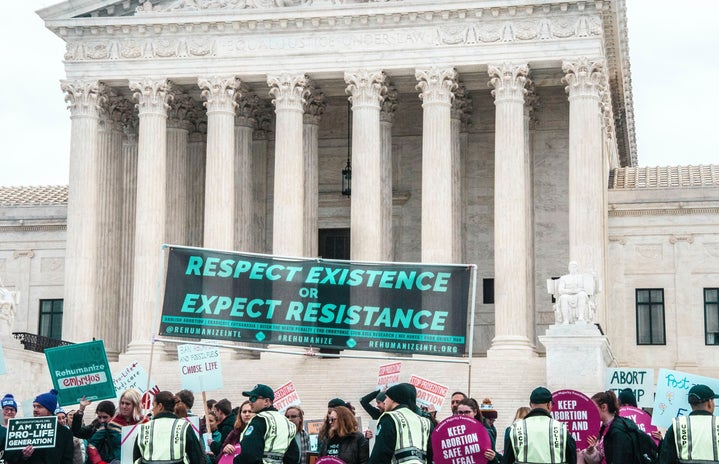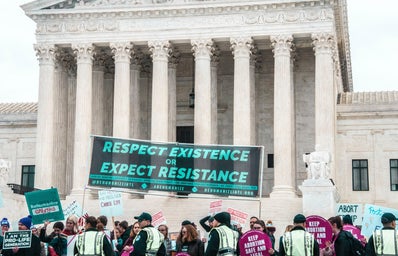For years, the fight for abortion rights has raged on across the country, but this month a major blow to pro-choice advocacy efforts has been dealt in the form of a controversial Texas abortion ban.
The statute took effect after the Supreme Court decided to let the law stand, despite continuing legal battles. The law, S.B. 8, is one of the nations most restrictive abortion bills, barring them at six weeks.
Six weeks is around the time a fetal heartbeat is detected, however most women are unaware they are pregnant at that time since it is often only two weeks after a missed period, according to a New York Times article.
S.B. 8 allows private citizens to sue abortion providers and anyone else who helps a woman get an abortion, with no exceptions for cases of rape or incest. Under this law, giving a woman a ride to a clinic or even providing financial assistance can be a violation. Private citizens do not need to show any connection to the people they are suing.
The reward for successfully suing an abortion provider under this law could be at least $10,000. To prepare for an influx of tips, Texas Right to Life has set up a “whistleblower” website where people can submit anonymous reports about anyone they believe is in violation of the law, NPR reported.
The tight 5-4 decision has drawn harsh criticism from local activists and our nation’s leaders alike. No other six-week ban has ever been allowed to go into effect.
In her dissent, Justice Sonya Sotomayor wrote that when “Presented with an application to enjoin a flagrantly unconstitutional law engineered to prohibit women from exercising their constitutional rights and evade judicial scrutiny, a majority of Justices have opted to bury their heads in the sand.”
Chief Justice John G. Roberts Jr., who is known as a conservative, joined the court’s three liberals, describing the plan to enforce the statute as “not only unusual, but unprecedented.”
“This extreme Texas law blatantly violates the constitutional right established under Roe v. Wade and upheld as precedent for nearly half a century,” said President Joe Biden in a statement criticizing the bill.
“The Texas law will significantly impair women’s access to the health care they need, particularly for communities of color and individuals with low incomes. And, outrageously, it deputizes private citizens to bring lawsuits against anyone who they believe has helped another person get an abortion, which might even include family members, health care workers, front desk staff at a health care clinic, or strangers with no connection to the individual,” the statement said. “My administration is deeply committed to the constitutional right established in Roe v. Wade nearly five decades ago and will protect and defend that right.”
House Speaker Nancy Pelosi also spoke out against the law, saying it “unleashes one of the most disturbing, unprecedented and far-reaching assaults on health care providers – and on anyone who helps a woman, in any way, access an abortion – by creating a vigilante bounty system that will have a chilling effect.”
Pelosi said the House, which currently has a Democratic majority, will vote on Congresswoman Judy Chu’s Women’s Health and Reproductive Act later this month.
“These lawsuits are not against the women,” John Seago, the head of the legislative department at Texas Right to Life, told NPR. “The lawsuits would be against the individuals making money off of the abortion, the abortion industry itself. So this is not spy on your neighbor and see if they’re having an abortion.”
Nancy Northup, the president and chief executive of the Center for Reproductive Rights, which is one of the groups suing texas, told The Washington Post that people across texas are panicking, leaving women wondering where and when they will be able to get an abortion, if ever.
According to Texas health and Human Services, reports show that 54,741 abortions took place in texas during 2020.
“We are devastated that the Supreme Court has refused to block a law that blatantly violates Roe v. Wade,” she said. “Texas politicians have succeeded for the moment in making a mockery of the rule of law.”
On social media, in classrooms, to their peers and beyond, many American University students have voiced their concerns about the law.
“S.B. 8 going into action is honestly terrifying,” said Elyssa Goswick, a senior at American in the School of International Service. “It goes against every past legal precedent for reproductive freedom and keep pregnant people from accessing abortion at all. The bounty system enforcing the law is dangerous and was clearly designed to intimidate people from seeking care or even helping others find the care they need. SCOTUS failing to strike down this ban sets a seriously scary precedent for the future of reproductive justice.”
Goswick, who is from Arizona, has previously interned with NARAL Pro-Choice America, a non-profit organization fighting for reproductive freedom. Her comments are not in connection with the organization and are her own personal thoughts on the subject.
This bill comes at a time when Republican-led legislatures have sought to enact restrictive abortion laws, including one Mississippi ban on abortions after 15 weeks that will be considered by the Supreme Court this fall.
Many states, including Texas, have also passed “trigger bills,” which would almost immediately outlaw all abortions within the state if the 1973 Roe v. Wade decision is overturned.


